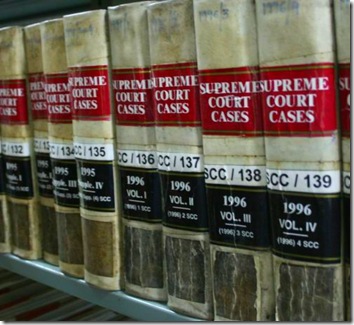
The Allahabad High Court (HC) and a Lucknow district court have given Supreme Court Cases (SCC) publisher Eastern Book Company (EBC) the go-ahead to publish and publicise orders in its favor in its ongoing dispute with Reed Elsevier India and Thomson Reuters.
In August 2012, EBC had won an ex parte temporary injunction in the Lucknow district court against Westlaw and Indlaw-owner Thomson Reuters followed in September 2012 by a ruling against Lexis Nexis and Buttersworth owner Reed Elsevier Inda.
The Lucknow order restrained the two publishers from commercially exploiting case reports and similar materials allegedly plagiarised from the SCC.
After the EBC circulated press releases publicising the two interim injunctions, as reported by Legally India and the SpicyIP blog at the time, Reed Elsevier India approached the Lucknow district court and in October obtained an order restraining EBC from giving publicity to the injunction against the company.
Legally India and SpicyIP did not remove the orders, and copies continued being hosted on EBC's website. Reed Elsevier then filed a contempt petition against EBC before the Lucknow district judge, which was was dismissed.
Reed Elsevier India continued with a writ in the Allahabad HC against the ex parte interim injunction order of the Lucknow court, against dismissal of the contempt petition, as well as asking for directions preventing EBC from publicising the earlier orders.
On 27 November the Allahabad HC dismissed the writ entirely and also stated in its order: “Learned counsel for the petitioner failed to demonstrate, in what manner the publication of the order will effect the fair trial of the suit or will prejudice the administration of justice.”
In an email to Legally India responding to the 27 November order, Reed Elsevier’s counsel wrote:
“The order categorically directs EBC to immediately withdraw all posts and press releases publicizing the said injunction order as well as refrain from indulging in any further publicity of the same […]
EBC contended that it is not new material but has been posted before the order [of October]. Notwithstanding the fact that on each date of publication of the same content, there was and is a new date appearing daily, amounting to fresh publication, which is a contempt of court and which conduct of theirs is a subject-matter of the pending litigation.
Publicising the [27 November] order not only goes against the spirit of the said order but also amounts to contempt of court and any assistance given by you in further publicity would tantamount to abatement of the contempt committed by EBC. Publicizing interim orders would make you liable for contempt of court.”
On 30 March 2013, the Lucknow district judge dismissed Thomson Reuters’ plea against the August 2012 ex parte temporary injunction, stating: “The order dated 18.09.2012 passed by this Court, to the effect that the plaintiffs shall not publish ex parte order of temporary injunction in newspapers, print media and electronic media, which has continuously been extended, is hereby vacated.”
A Thomson Reuters spokesperson wrote in an emailed statement:
“We are disappointed by the Honourable District Court's decision confirming the temporary injunction against Thomson Reuters. To be clear, this order does not impact the delivery of Indlaw and Westlaw India content to our subscribers.
“[…] we do take issues regarding copyright very seriously. Indlaw and Westlaw India content is produced to our exacting standards, and we are confident that it meets all applicable tests, and does not infringe on any other publisher's copyright.”
EBC, in an emailed statement said: “The temporary injunction earlier was an ex-parte order. This has now been confirmed after hearing the arguments of both parties after several hearings […] over many days. Confirmation of the [temporary injunction] is a reaffirmation of the prima facie view of the District Judge regarding the infringement by the defendants.”
The District judge has fixed 6 May 2013 for framing issues on merits in the copyright dispute.